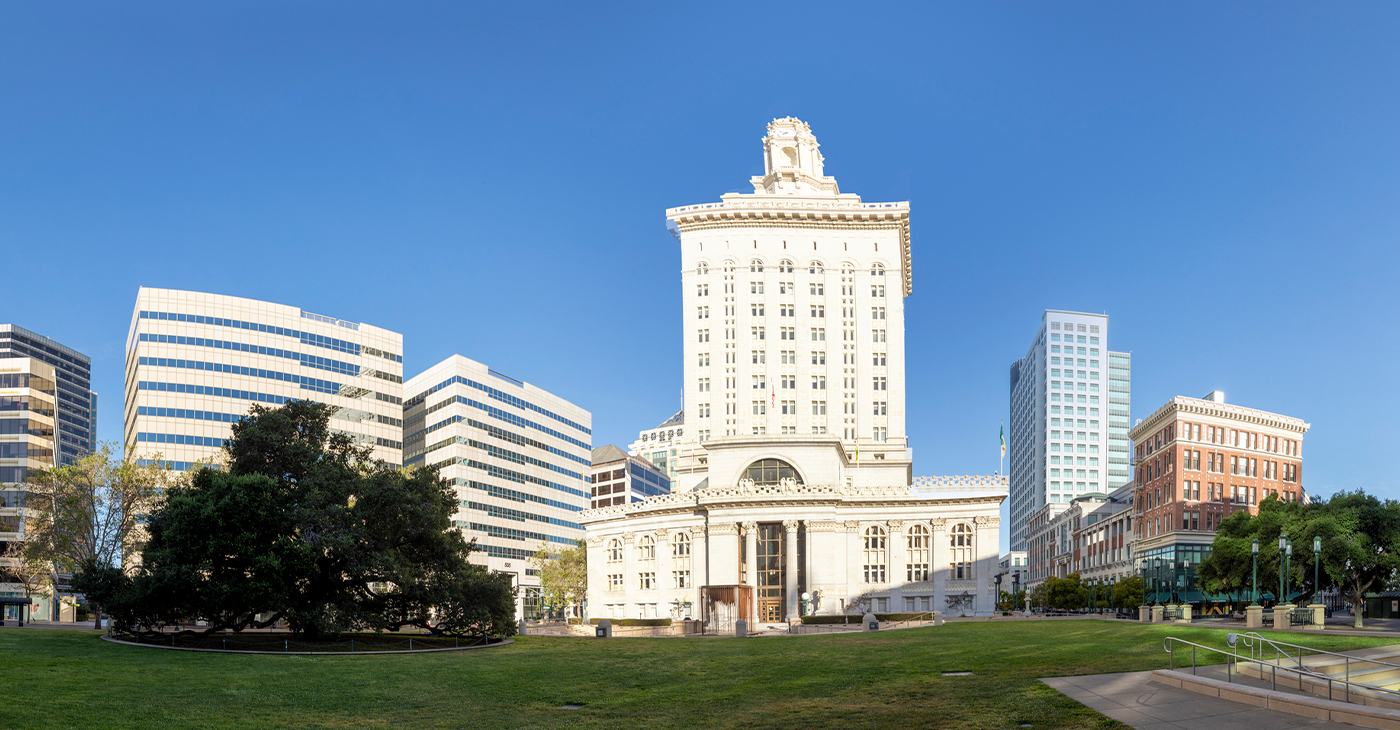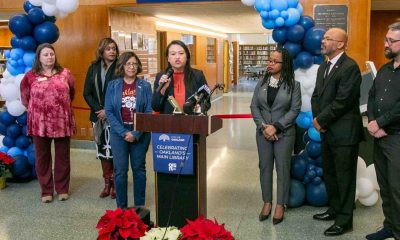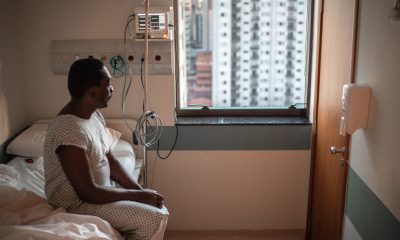Bay Area
San Francisco Opens Linkage Center as Part of Tenderloin Emergency Initiative
“Our work in the Tenderloin requires all of our City departments and community partners working together to address the major challenges we know exist,” said Mayor London Breed. “As part of that work, this Linkage Center will help us create a space for people who are struggling with addiction and other challenges to get immediate support, and then transition into longer term care and housing. This is hard work, and I appreciate everyone joining in partnership to make a difference for the people of the Tenderloin.”

Once fully staffed, the Center will serve up to 100 guests at a time connecting people to short- and long-term services, care, and programs
From S.F. Mayor’s Office of Communication
Initial operations commenced at the Tenderloin Linkage Center on Tuesday. The newly opened Tenderloin Linkage Center is an essential component of San Francisco’s Tenderloin Emergency Initiative that is forging a path to promote a thriving community and save lives through overdose prevention and connecting people to care and services.
“Our work in the Tenderloin requires all of our City departments and community partners working together to address the major challenges we know exist,” said Mayor London Breed. “As part of that work, this Linkage Center will help us create a space for people who are struggling with addiction and other challenges to get immediate support, and then transition into longer term care and housing. This is hard work, and I appreciate everyone joining in partnership to make a difference for the people of the Tenderloin.”
The center, located at 1172 Market St., will initially operate seven days a week from 8 a.m. to 8 p.m. and have reduced capacity due to the impacts of COVID-19 on staffing availability.
The Center will expand to operate 24 hours a day and seven days a week and have the capacity to serve 100 guests at a time.
The Tenderloin Linkage Center is a services-focused location designed to provide a safe, welcoming space for those ready to access San Francisco’s health and human service resources easily and quickly.
Basic services such as hot food; water; hygiene services such as laundry, bathrooms, and showers; personal protective equipment (PPE); and more are available at the Center.
Weekly wellness programs will also be hosted there to provide services like COVID-19 vaccination and testing as well as HIV and Hepatitis C testing.
Additionally, the new Tenderloin Linkage Center will connect people to short- and long-term services, care, and programs. Programs and services include, but are not limited to:
- Behavioral health care
- Shelter
- Transitional housing
- Housing assistance
- Homeward bound
- Sobering, detox and respite
- Substance use treatment
- Food coordination
- Vocational support
- Therapy and mentoring
- Child and family care
- Veteran support
People can self-present to the Center or arrive via vehicle or foot escort from a community partner, if requested.
If City outreach teams, first responders or community service providers encounter people on the street who may benefit from this Center, they can call upon a health or social services partner to provide more information and an escort to the site, if desired. People may come and go freely to and from the Center.
“A drop-in center where people can get off the streets and immediately linked to services, placements and care, without delay or bureaucracy is something we desperately need,” said Supervisor Matt Haney. “The City is facing a deadly, devastating drug epidemic, and we must do everything we can to save lives and provide relief and healing to a part of the city that has been so heavily impacted. The Tenderloin Linkage Center will absolutely support us in doing that.”
“I am optimistic that the new linkage center will provide new and useful services for Tenderloin residents who are battling mental illness and drug addiction,” said Supervisor Hillary Ronen. “I am also watching its success closely to see if it could be converted into a citywide resource as the permanent site of the upcoming Mental Health SF Service Center.”
Tenderloin Linkage Center staff, including escorts, are provided by community-based organizations including HealthRIGHT 360, Urban Alchemy and Project Homeless Connect.
Activism
Oakland Post: Week of December 25 – 31, 2024
The printed Weekly Edition of the Oakland Post: Week of December 25 – 31, 2024

To enlarge your view of this issue, use the slider, magnifying glass icon or full page icon in the lower right corner of the browser window. ![]()
Bay Area
Glydways Breaking Ground on 14-Acre Demonstration Facility at Hilltop Mall
Glydways has been testing its technology at CCTA’s GoMentum Station in Concord for several years. The company plans to install an ambitious 28-mile Autonomous Transit Network in East Contra Costa County. The new Richmond facility will be strategically positioned near that project, according to Glydways.

The Richmond Standard
Glydways, developer of microtransit systems using autonomous, small-scale vehicles, is breaking ground on a 14-acre Development and Demonstration Facility at the former Hilltop Mall property in Richmond, the Contra Costa Transportation Authority (CCTA) reported on social media.
Glydways, which released a statement announcing the project Monday, is using the site while the mall property undergoes a larger redevelopment.
“In the interim, Glydways will use a portion of the property to showcase its technology and conduct safety and reliability testing,” the company said.
Glydways has been testing its technology at CCTA’s GoMentum Station in Concord for several years. The company plans to install an ambitious 28-mile Autonomous Transit Network in East Contra Costa County. The new Richmond facility will be strategically positioned near that project, according to Glydways.
The new Richmond development hub will include “over a mile of dedicated test track, enabling Glydways to refine its solutions in a controlled environment while simulating real-world conditions,” the company said.
Visitors to the facility will be able to experience on-demand travel, explore the control center and visit a showroom featuring virtual reality demonstrations of Glydways projects worldwide.
The hub will also house a 13,000-square-foot maintenance and storage facility to service the growing fleet of Glydcars.
“With this new facility [at the former Hilltop Mall property], we’re giving the public a glimpse of the future, where people can experience ultra-quiet, on-demand transit—just like hailing a rideshare, but with the reliability and affordability of public transit,” said Tim Haile, executive director of CCTA.
Janet Galvez, vice president and investment officer at Prologis, owner of the Hilltop Mall property, said her company is “thrilled” to provide space for Glydways and is continuing to work with the city on future redevelopment plans for the broader mall property.
Richmond City Manager Shasa Curl added that Glydways’ presence “will not only help test new transit solutions but also activate the former Mall site while preparation and finalization of the Hilltop Horizon Specific Plan is underway.
Alameda County
Last City Council Meeting of the Year Ends on Sour Note with Big Budget Cuts
In a five to one vote, with Councilmembers Carroll Fife and Janani Ramachandran excused, the council passed a plan aimed at balancing the $130 million deficit the city is facing. Noel Gallo voted against the plan, previously citing concerns over public safety cuts, while Nikki Fortunato-Bas, Treva Reid, Rebecca Kaplan, Kevin Jenkins, and Dan Kalb voted in agreement with the plan.

By Magaly Muñoz
In the last lengthy Tuesday meeting of the Oakland City Council for 2024, residents expressed strong opposition to the much needed budget cuts before a change in leadership was finalized with the certification of election results.
In a five to one vote, with Councilmembers Carroll Fife and Janani Ramachandran excused, the council passed a plan aimed at balancing the $130 million deficit the city is facing. Noel Gallo voted against the plan, previously citing concerns over public safety cuts, while Nikki Fortunato-Bas, Treva Reid, Rebecca Kaplan, Kevin Jenkins, and Dan Kalb voted in agreement with the plan.
Oakland police and fire departments, the ambassador program, and city arts and culture will all see significant cuts over the course of two phases.
Phase 1 will eliminate two police academies, brown out two fire stations, eliminate the ambassador program, and reduce police overtime by nearly $25 million. These, with several other cuts across departments, aim to save the city $60 million. In addition, the council simultaneously approved to transfer restricted funds into its general purpose fund, amounting to over $40 million.
Phase 2 includes additional fire station brownouts and the elimination of 91 jobs, aiming to recover almost $16 million in order to balance the rest of the budget.
Several organizations and residents spoke out at the meeting in hopes of swaying the council to not make cuts to their programs.
East Oakland Senior Center volunteers and members, and homeless advocates, filled the plaza just outside of City Hall with rallies to show their disapproval of the new budget plan. Senior residents told the council to “remember that you’ll get old too” and that disturbing their resources will only bring problems for an already struggling community.
While city staff announced that there would not be complete cuts to senior center facilities, there would be significant reductions to staff and possibly inter-program services down the line.
Exiting council member and interim mayor Bas told the public that she is still hopeful that the one-time $125 million Coliseum sale deal will proceed in the near future so that the city would not have to continue with drastic cuts. The deal was intended to save the city for fiscal year 2024-25, but a hold up at the county level has paused any progress and therefore millions of dollars in funds Oakland desperately needs.
The Coliseum sale has been a contentious one. Residents and city leaders were originally against using the deal as a way to balance the budget, citing doubts about the sellers, the African American Sports and Entertainment Group’s (AASEG), ability to complete the deal. Council members Reid, Ramachandran, and Gallo have called several emergency meetings to understand where the first installments of the sale are, with little to no answers.
Bas added that as the new Alameda County Supervisor for D5, a position she starts in a few weeks, she will do everything in her power to push the Coliseum sale along.
The city is also considering a sales tax measure to put on the special election ballot on April 15, 2025, which will also serve as an election to fill the now vacant D2 and mayor positions. The tax increase would raise approximately $29 million annually for Oakland, allowing the city to gain much-needed revenue for the next two-year budget.
The council will discuss the possible sales tax measure on January 9.
-

 Activism4 weeks ago
Activism4 weeks agoOakland Post: Week of November 27 – December 3, 2024
-

 Activism2 weeks ago
Activism2 weeks agoButler, Lee Celebrate Passage of Bill to Honor Congresswoman Shirley Chisholm with Congressional Gold Medal
-

 Activism2 weeks ago
Activism2 weeks agoPost News Group to Host Second Town Hall on Racism, Hate Crimes
-

 Activism2 weeks ago
Activism2 weeks agoDelta Sigma Theta Alumnae Chapters Host World AIDS Day Event
-

 Business2 weeks ago
Business2 weeks agoLandlords Are Using AI to Raise Rents — And California Cities Are Leading the Pushback
-

 Activism3 weeks ago
Activism3 weeks agoOakland Post: Week of December 4 – 10, 2024
-

 Arts and Culture1 week ago
Arts and Culture1 week agoPromise Marks Performs Songs of Etta James in One-Woman Show, “A Sunday Kind of Love” at the Black Repertory Theater in Berkeley
-

 Activism2 weeks ago
Activism2 weeks agoOakland Post: Week of December 11 – 17, 2024





























































